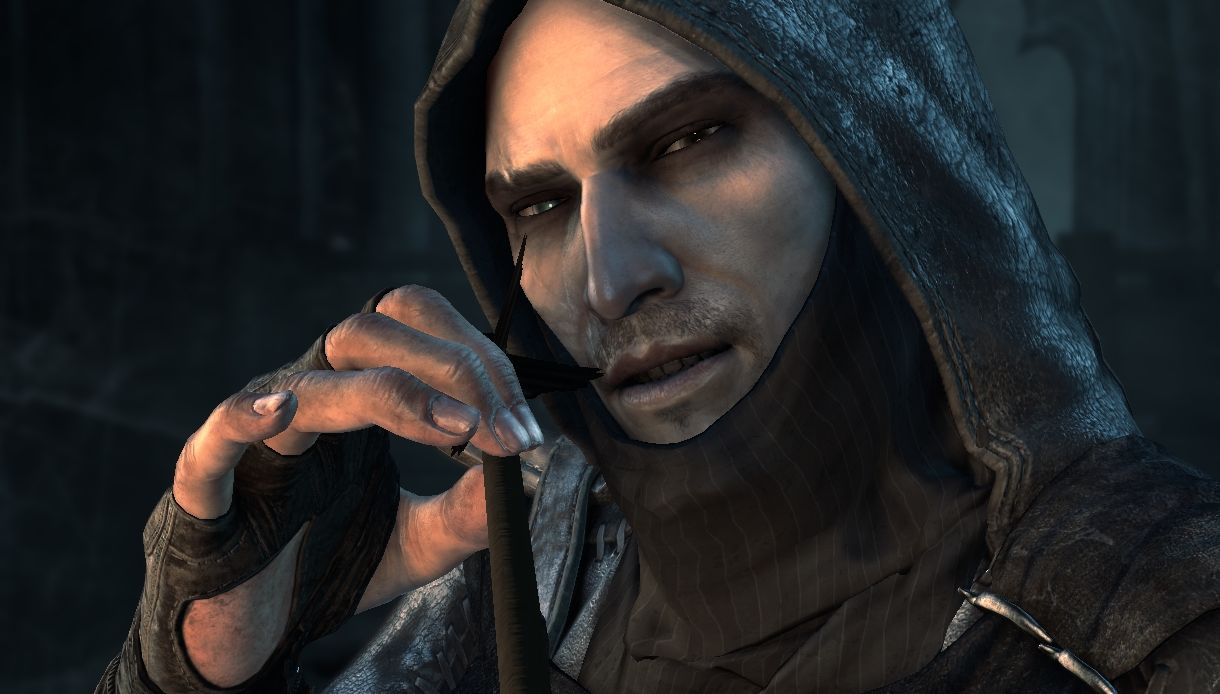Our Verdict
Great in places, but never quite lives up to its potential. A competent sequel let down by inconsistency.
PC Gamer's got your back
Thief – the series – has been many things. It is the grandfather of stealth on the PC, part of a design heritage that links Quake to System Shock 2, System Shock 2 to Deus Ex, and so on. It stands for the idea that 'first person' doesn't imply 'shooter': the original BioShock might be its great-grandchild, but Amnesia and Gone Home are Thief's descendents too.
It is the actualisation of a very specific fantasy – the outlaw shadow, Robin Hood by way of Batman – and more broadly representative of a particular type of fantasy, a gothic marriage of Hexen's para-medieval grotesquerie and '90s-era steampunk. For some players, Thief is about precision – perfect sequences of evasion and distraction forged with much hammering of the quick load key. For others, it's a game of improvisation, gambits, brawls and hair's breadth escapes.
For many, it's about atmosphere. The sense of being an intruder. The latent threat of an Auldale mansion at night, the mysteries of an underground city, the terrors of The Cradle. Thief's settings are a showcase for exemplary art and level design talent, a legacy that begins with Looking Glass Studios and ends with The Dark Mod, with the gaming community.
Thief has had its less glamorous moments, too. It has been an intellectual property languishing at the bottom of a drawer, awaiting the day when the market reports come in and the market reports say we need Assassin's Creed . The drawer opens a crack; light touches an image of a man in a hood crouching on a rooftop. “This'll do,” a publisher says, somewhere.
Thief – the series – has been many things. Eidos Montreal's Thief is, well, some of them.
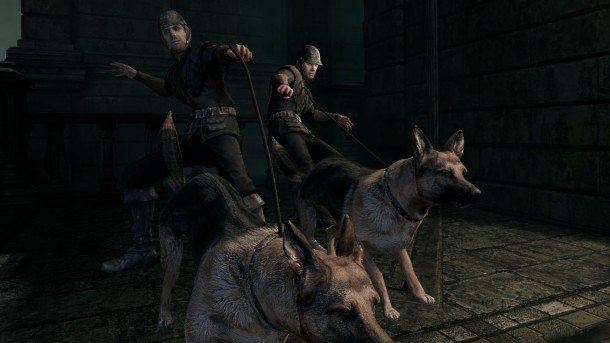
Let's start with the good news. The developers have listened to negative feedback and dialed back on quicktime events and slo-mo nonsense. Beyond the standard spread of difficulty modes you have the option to play with customised settings, enabling purists to disable everything they feel intrudes on their game, from objective markers to entire features. Using custom difficulties, you can play Thief with campaign-spanning permadeath, quicksaves disabled, or the stipulation that being detected at all constitutes mission failure.
If you feared that Eidos Montreal were going to dumb down your favourite game, lower your pitchforks: they have given you the power to smarten it back up. That said, I recommend playing it through once on the hardest setting before you start tinkering.
After a linear but necessary tutorial on the rudiments of stealth, climbing, distracting guards and picking locks, Thief opens strong. The first wave of relief hit me early, during an opportunistic jewelry shop heist that occurs mid-way through the opening chapter. I'd jimmied a rear window and slipped in undetected, swiping cups and inkpots off shelves before sliding into a side room where a guard lay dozing in an armchair. I extinguished some candles and, in the dark, began to crack a safe embedded in the wall. This involves a simple minigame where each tumbler is unlocked by feeling for a particular sweet spot. Crack it at the right time and the action is silent: fail and the lock clicks loudly. I failed on the second tumbler.
The guard woke up, but remained in his armchair. I darted behind it and waited until he went back to sleep, listening carefully to the sound of his breathing. I always played Thief games for these near-miss moments, and in that instant I felt like Garrett again.
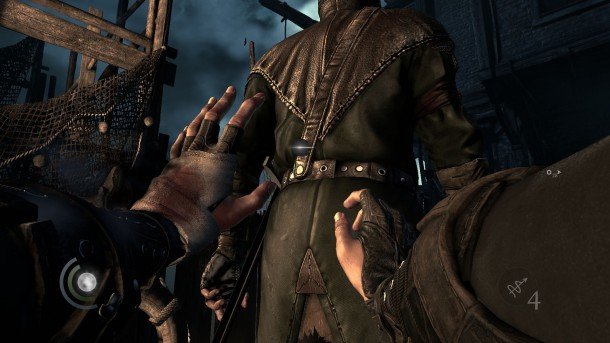
Later, while I was hiding in a cabinet in the kitchen of a mansion belonging to The City's foremost architect, a wandering cook threatened to discover the body of a guard I'd stashed in the corner of the room. Forced to improvise, I slipped out of the cabinet, picked up a wine glass, and threw it across the room where it smashed against the far wall. The cook span around to look and I dashed behind him, scooping up the unconscious guard and slipping away to hide him elsewhere.
On a moment-by-moment level, Thief delivers on the fantasy of being Garrett as well as – if not better than – its predecessors.
Much is owed to the way the game feels. The City is a handsome place in its modern iteration: while Thief might lack Dishonored's distinctive art style, it boasts a level of detail that gives it a real sense of place. The entire game takes place at night, but colour is used carefully to distinguish areas and make it clear when you're concealed in shadow. This is matched with a spread of audio-visual tricks that fill in for Garrett's instincts. Guards have multiple levels of awareness, and if someone catches sight of you the first you'll know of it is a stirring on the soundtrack that conveys the sense that you're being watched. In combat, your vision narrows; when sprinting the world seems to contract around your point of focus, tilting as you bank around corners and attempt to break line of sight.
Garrett is phenomenally animated. Your body and hands are always visible and interact seamlessly with the environment. Items don't simply vanish when you collect them – you pick them up and pocket them. Whether you're rifling through drawers, dialing in a safe combination or snuffing out candles, Thief achieves a sense of physical presence that few first-person games can match.
Then there's swooping. Swooping is good. A tap of the spacebar at any time results in a silent stealth dash that both speeds Garrett up and lowers his profile – it's half dive, half lunge. It's used to get from shadow to shadow, from guard to guard, from room to room. It solves the same problem that Dishonored's teleportation power did, but does so in a way that feels less like cheating. Its use is mitigated by stamina – also used for sprinting – and by caged birds and dogs who can be startled by sudden movement.
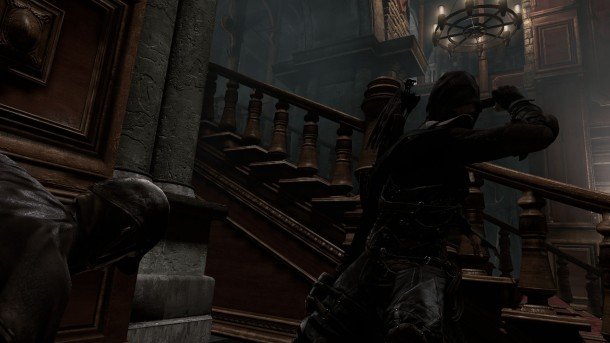
When it all comes together Thief feels dextrous, physical and fluid to play. Many interactions are context sensitive – jumping and climbing in particular – and where problems emerge it's because Garrett doesn't do quite what you expect. Sometimes you'll peek around a corner when you intended to steal something from the top of a table, and sometimes you'll jump to your death when you thought you were facing a gap you could easily cross. These are issues, but eventually you learn to look before you leap.
The cost of this tactile traversal is that the freedom of movement provided by Garrett's gadgets has been strictly curtailed. Rope arrows now only lodge into pre-determined points, making them ways of accessing pre-designed hidden routes rather than a means to create your own. Water arrows serve their purpose but the presence of electric lights in many buildings – deactivated by switches which can be hit with regular arrows – renders them situational. Moss arrows are gone, and a variety of lethal options went unused as the game (happily) didn't require me to kill anybody.
Focus is an upgradable vision mode that makes use of Garrett's enhanced eye. I normally hate magic vision in stealth games, but in Thief it's a little better than usual. By default you can use it to detect interactive items and by investing skill points you can add new functionality such as slowing down time while performing certain actions, perceiving the inside of locks, or unlocking the ability to stun alert guards with a carefully-aimed blackjack blow to the chest. You might find yourself needing the latter, by the way: combat is incredibly hard to survive on higher difficulties, as it should be.
It took me 15 hours to complete the campaign with the majority of side activities factored-in. The City plays the role of mission hub, not only linking each chapter but also offering a range of activities of its own. It's large but narrow and divided into pre-planned routes that you'll become very familiar with as you crisscross its rooftops over and over. The majority of side missions are single-room stealth or puzzle challenges, but half a dozen take place in entirely new areas. These are a highlight: small but open-ended environments that suit Thief's tight take on stealth.
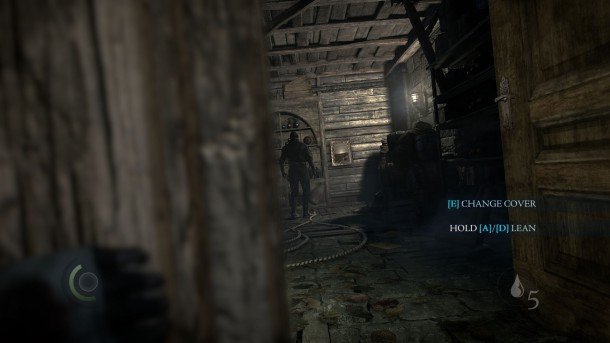
Any mission can be replayed at any time if you wish to go back and try for a better rating. There's also a well-implemented challenge mode, accessed from the main menu, that enables you to make timed runs on reworked versions of certain mission areas. Factor-in secret areas and elusive special loot and Thief has good mileage beyond its initial running time.
It displays a laudable faith in Thief's basic mechanics that you're given so many different ways to play with them – and for the most part, they hold together. Where the game starts to lose points is in the inconsistency of its level design and the patchy, unsatisfactory arc of its main campaign.
A warning for long-time fans: this is a reboot. The old factions are gone and Garrett's backstory has been entirely discarded. Key motifs return – Garrett's magic eye, the clash between machines and magic, lost cities, supernatural enemies, and so on – but the result is incoherent. I was actually confused about whether it was a reboot or not for the first few hours, and the inclusion of imagery from previous games complicates things even further. Entire plot threads go nowhere and the whole feels cobbled together despite some individually adept moments. Garrett is given a protegé, Erin, who acts as an interesting foil at the beginning but this relationship isn't explored particularly well.
The campaign feels like it has been assembled from parts of discarded Thief sequels – straight successors here, reboots there, bits of this, bits of that. Thief's previous selves surface from time to time as ugly reminders of the game that almost was, and the campaign is deeply inconsistent as a result. The missions that focus around actual thieving are strong, and whenever you're given a defended area to infiltrate the game comes together. Elsewhere, not so much. You'll dodge bits of an exploding building and attempt to evade alert guards in a boxed-in area right out of Batman: Arkham Asylum. You'll explore a haunted mental asylum that has none of the terrible brilliance of Deadly Shadows' haunted orphanage. There are a couple of dumb boss encounters – better than Deus Ex: Human Revolution, but, yeah. Boss encounters.
Certain areas are linked by brief third-person climbing sequences straight out of Assassin's Creed, in which Garrett's skills feel disconnected from what you can do in the regular game. Then there's a chase sequence that gets Thief about as wrong as it is possible to get it – you dash across rooftops and steer Garrett into cinematic scrape after cinematic scrape. Slow down or screw up and you're killed by dogs. It's rubbish, so why is it here? There's a fascinating tale to be told about the development of this game, I suspect.
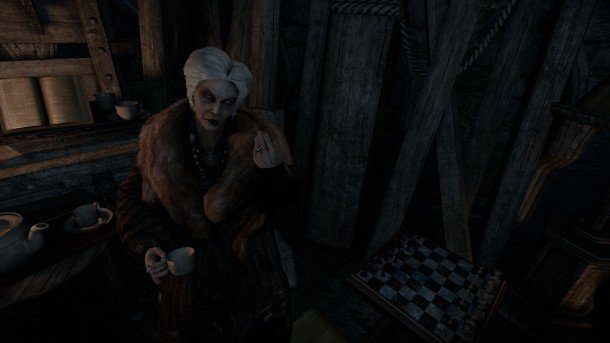
The game has brief dalliances with idiosyncrasy. One optional objective involves stealing beautiful but unsettling paintings by a troubled artist – images of humanoid animals in paganistic garb attached to new-agey epithets. It's as close as the game gets to the turn-of-the-century fantasism that is central to Thief's thematic legacy, if not its gaming one. There's also full frontal nudity – think of the Game of Thrones TV series and you won't be far off the mark. It's not the most egregious sexual imagery ever committed to videogame, but it is explicit, and it'll be off-putting for some.
It also has bugs. At the time of writing these range from series-staple AI weirdness – guards spinning on the spot, characters repeating the same lines of dialogue over and over, the odd omniscient crossbowman – to more serious issues with slowdown. Playing on an i5 system with 16GB of RAM and a GTX 560 Ti I experienced occasional choppiness despite an otherwise steady framerate. There's a benchmarking tool in the main menu to help you find the right settings, but the game seems to struggle with certain scenes regardless. There's also an infrequent but annoying bug where leaving certain menus will trap the screen in a vertically letterboxed 4:3 aspect ratio.
Technical issues aside, there is skill evident in Thief's execution. The team at Eidos Montreal clearly know a lot about interaction design, and enough about level construction to build exciting places to plunder. I wish, however, that this fundamental competence had been matched to a more ambitious and coherent vision.
Thief – the series – has been many things, but it has always been important. The history of PC games doubles as a history of great ideas, and the other thing that the original Thief games, System Shock and Deus Ex have in common is that they expanded our sense of what the medium was capable of. It might be unfair to expect a modern reboot to capture that catalytic fire, but I'm starting to suspect that it's flat-out unrealistic too. Genius has a hard time emerging from a system that also allows the phrase 'rooftop dog chase cinematic quicktime event' to be taken from concept to execution.
Whether you are heartbroken or merely disappointed by Thief's muddled sense of self will depend on exactly how invested you are in PC gaming's creation myth. This is a decent stealth game that feels nice to play, and that'll be enough for many – and if you feared the worst, you can rest a little easier. But the thing about evading disaster is that sometimes greatness slips away too.
Great in places, but never quite lives up to its potential. A competent sequel let down by inconsistency.
Joining in 2011, Chris made his start with PC Gamer turning beautiful trees into magazines, first as a writer and later as deputy editor. Once PCG's reluctant MMO champion , his discovery of Dota 2 in 2012 led him to much darker, stranger places. In 2015, Chris became the editor of PC Gamer Pro, overseeing our online coverage of competitive gaming and esports. He left in 2017, and can be now found making games and recording the Crate & Crowbar podcast.
